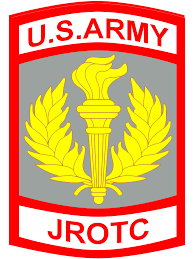
-
The Army Junior Reserve Officer Training Corps (JROTC) is a program offered to high schools that teaches students character education, student achievement, wellness, leadership, and diversity. It is a cooperative effort between the Army and the high schools to produce successful students and citizens, while fostering in each school a more constructive and disciplined learning environment. The outcomes of the JROTC program are:
- Act with integrity and personal accountability as they lead others to succeed in a diverse and global workforce
- Engage civic and social concerns in the community, government, and society
- Graduate prepared to excel in post-secondary options and career pathways
- Make decisions that promote positive social, emotional, and physical health
- Value the role of the military and other service organizations
With the school’s support, the JROTC program achieves these outcomes by using a world-class 21st Century, technology driven, student centered curriculum. The curriculum consists of education in citizenship, leadership, social and communication skills, physical fitness and wellness, geography, and civics.
The curriculum is facilitated and taught by retired Army personnel. Qualified retired Army personnel are employed by the schools to teach the JROTC curriculum. JROTC teacher qualifications are based on military experience, maturity, stability, and leadership acquired over 20 years of service to our nation. To safeguard the viability of the JROTC program, the Department of Defense (DoD) and the Department of Education endorse the proposition that states recognize that JROTC instructors are certified to teach JROTC and the array of subject areas embedded (e.g., Physical Education, Health/Wellness, Civics, etc.).
JROTC is a successful program, making substantial contributions to students, schools, and communities which benefit greatly from its presence. The benefits of JROTC are reflected in metrics impacting all schools in the U.S.
JROTC Curriculum
-
The JROTC curriculum, which fully or partially addresses a number of national academic standards – to include Common Core State Standards (CCSS) – includes course work on leadership, civics, geography and global awareness, health, and wellness, language arts, life skills, and U.S. history. The curriculum is based on the principles of performance-based, learner-centered education and promotes development of core abilities: capacity for life-long learning, communication, responsibility for actions and choices, good citizenship, respectful treatment of others, and critical thinking techniques.More important that “what” is learned in JROTC is “how” it is learned. Every classroom is equipped with leading edge technologies to teach, assess, and report student progress. Teachers are trained to utilize a range of technologies and develop social/emotional skills, support academic content through gaming and simulations, and promote the role of social media. Thus, students engage in meaningful, purposeful activities that lead them to demonstrate success through a portfolio of accomplishments. A cadet beginning the ninth grade might follow a course similar to the one below:
Leadership Education & Training
Year 1
Year 2
Year 3
Year 4
Unit 1: Citizenship in Action Foundations of Army JROTC
Getting InvolvedThe Nation’s Defense Forces Unit 2: Leadership Theory & Application Being a Leader Knowing How to Lead Leading Situations Leadership Lab Unit 3: Foundations for Success Know yourself – Socrates
Study SkillsCommunication Skills
Conflict Resolution
Teaching SkillsMaking a Difference w/Service Learning
Career PlanningPlanning Skills
Social Responsibility
NEFE High School Financial Planning ProgramUnit 4: Wellness, Fitness, and First Aid Achieving a Healthy Lifestyle Cadet Challenge First Aid for Emergency and non-Emergency Situations
Drug Prevention/InterventionUnit 5: Geography, Map Skills & Environmental Awareness The Globe Maps, Map Reading and Land Navigation Orienteering
Air NavigationExploring the World Unit 6: Citizenship in American History & Government You the People – Citizenship Skills
Your Job as an American CitizenYou the People – Citizenship Action Group Process
Founding and Growth of a Nation (history 1776 to present)The Federal Judicial System
Sources of powerAdvanced Citizenship and American History







